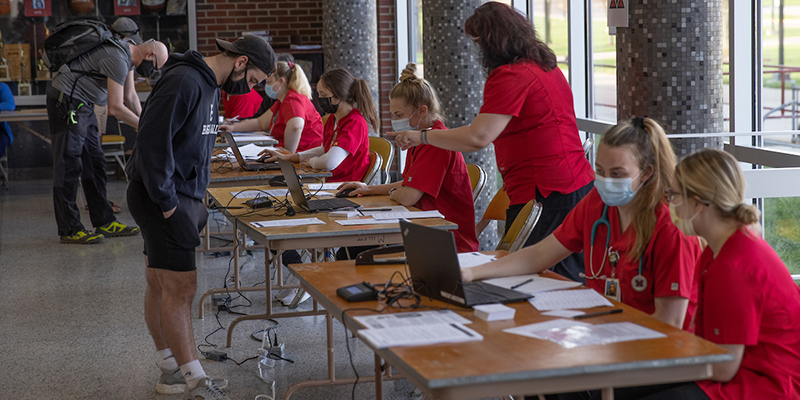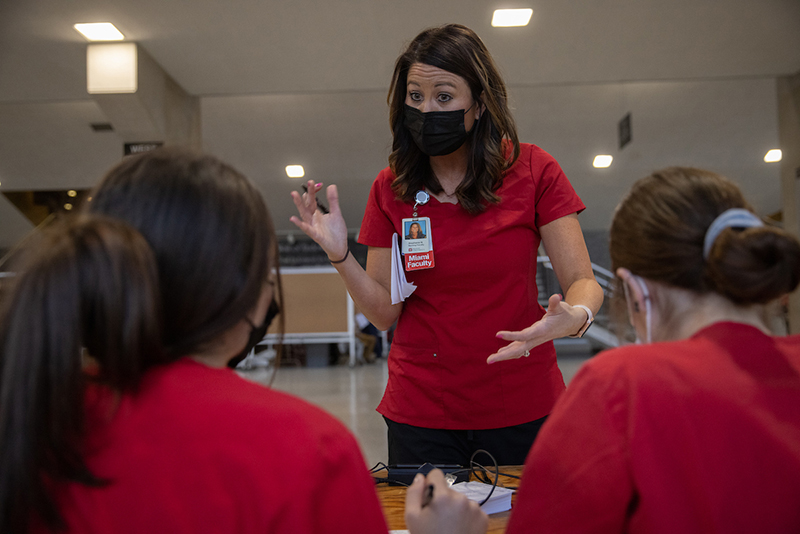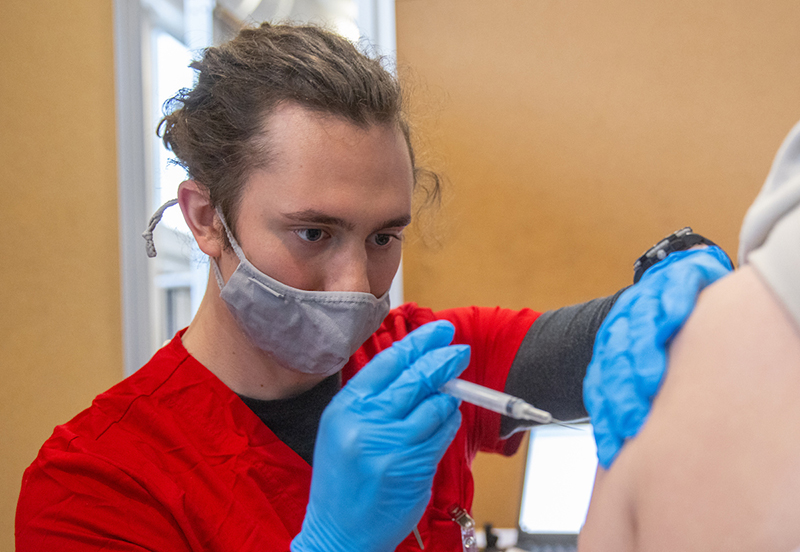Nursing students stand ready as part of Miami's vaccination effort
As Miamians roll up their sleeves for COVID-19 vaccines, nearly 167 nursing students stand ready to help.

Nursing students stand ready as part of Miami's vaccination effort

Stephanie Nicely of Miami's nursing program speaks to students during the April 7 employee vaccination clinic. (Photos by Scott Kissell.)
By Carole Johnson, university news and communications
As Miamians roll up their sleeves for COVID-19 vaccines, nearly 167 nursing students stand ready to help.
The students underwent training at Miami, along with TriHealth, in order to support vaccination clinics across Butler County. Not only can students administer the vaccines, but they are also trained in all aspects of community-based care.
They will be on hand during Miami’s vaccination clinics, scheduled for the first two weeks of April on the Oxford campus for both employees and students as part of Ohio Governor Mike DeWine's statewide immunization initiative to fight COVID-19.
The State of Ohio has provided Miami with 1,000 Moderna COVID-19 vaccines for employees and 3,500 Pfizer COVID-19 vaccines for students. All vaccines are provided at no charge to employees and students. While the vaccine is voluntary and not required, the university has encouraged its employees and students to get vaccinated.
"Along with administering the Covid-19 vaccines, the nursing students will play a critical role in helping achieve state and national immunization goals and slowing the spread of the virus," according to Stephanie Nicely, associate professor of nursing who teaches the course, Community Health Nursing and Population Focused Nursing Care.
Students will provide education on the vaccines that have received emergency use authorization. Other duties include registering participants and scheduling them for the second dose since the vaccines are of the two-dose variety. They also will monitor participants for any adverse reactions to the vaccine in the post-vaccination areas. The students can experience how all the components of a mass vaccination clinic work.
Earlier in March, Miami’s nursing students and those in the speech, pathology and audiology program received their vaccines in a clinic hosted by the Butler County General Health District and Medical Reserve Corps on the Hamilton campus. Members of Miami’s nursing faculty helped administer the vaccinations to the university’s clinical students because the vaccine had not yet been available to them.
“No words can describe the weight of this experience for me. It was so emotional to see the students be part of something — a historical event,” Nicely said.
Mike Croy prepares to give a vaccine to an employee. (More photos of the April 7 clinic are available online at Through the Lens: Vaccination Clinic.)
Nicely is amazed at the ability and fortitude displayed by the students. They balance their emotions as they deal with the day-to-day demands of their training. Many of the students are in clinical rotations in hospitals and nursing homes. Daily reminders of the seriousness of this pandemic are real. Students have witnessed patients struggling. They have seen death. Some students have lost loved ones.
“Spring semester 2021 provided a rare and, what we hope to be, a once-in-a-lifetime event for our nursing students to work in a global pandemic,” Nicely said.
Being part of the solution motivated nursing major Mike Croy as he trained. Croy Is passionate about helping people. He is fascinated by the way the natural world works and the intersection of how practical health practices can save lives; for example, the simple task of washing hands.
He was among 47 nursing students and faculty who provided care during the April 7 employee vaccination clinic held on the Oxford campus. Croy said the day went very well and he is much more confident as a result.
Rachel Edwards, also a nursing student, said they were given one-on-one faculty support while administering the vaccines, and she is extremely grateful for the experience.
"It was exhilarating to not only see history being made, but to be a part of a rare, large-scale event," she said.
Croy added, “It’s super cool to be at the grassroots level. What these vaccines bring is a sense of hope.”
